- Home
- Junot Díaz
The Best American Short Stories 2016 Page 5
The Best American Short Stories 2016 Read online
Page 5
Eventually the spilled excrement found its way into Hamda One’s mouth. The hysterical laughter gave way to a series of violent, ricocheting coughs. By now, almost all of the bucket’s content was on the ground. With palm-covered mouths and noses we stared. Hamda One laughed and coughed until his body couldn’t take it any longer. He collapsed in a heap and died instantly. His smeared face, mouth agape in mid-laughter, was the last we saw of the latrine man.
It was as if the spirits that had for several weeks stifled our laughter had suddenly decided to relieve us of our suffering; we could not make eye contact without bursting into teary laughter. Mallam Imran issued a fatwa for every adult to observe a three-day fast, “to ward off the evil forces that are bent on destroying this community.” Nobody paid attention to the boka, not even the mendicants, who were, by this time, more preoccupied with finding something to eat than following an edict that could starve them to death.
With the owl’s visit still on our minds, with the fear of hunger and the brutality of the soldiers overwhelming us, with the fate of Baba Ila still unknown, with the smoke from recently bombed houses choking our lungs, with the grotesque end of Hamda One unexplained, with the stench of feces still fresh in our noses, with the chants of “A luta continua!” and “Let the blood flow!” ruling the air in the town proper, we retreated to our compounds and reverted to our go-to mantra in times of crisis: Insha Allah!
TAHMIMA ANAM
Garments
FROM Freeman’s
ONE DAY MALA lowers her mask and says to Jesmin, my boyfriend wants to marry you. Jesmin is six shirts behind so she doesn’t look up. After the bell, Mala explains. For months now she’s been telling the girls, ya, any day now me and Dulal are going to the Kazi. They don’t believe her, they know her boyfriend works in an air-conditioned shop. No way he was going to marry a garments girl. Now she has a scheme and when Jesmin hears it, she thinks, it’s not so bad.
Two days later Mala’s sweating like it’s July. He wants one more. Three wives. We have to find a girl. After the bell they look down the row of sewing machines and try to choose. Mala knows all the unmarried girls, which one needs a room, which one has hungry relatives, which one borrowed money against her wage and can’t work enough overtime to pay it off. They squint down the line and consider Fatima, Keya, Komola, but for some reason or other they reject them all. There’s a new girl at the end of the row, but when Mala takes a break and limps over to the toilet she comes back and says the girl has a milky eye.
There’s a new order for panties. Jesmin picks up the sample. She’s never seen a panty like it before. It’s thick, with double seams on the front, back, and around the buttocks. The leg is just cut off without a stitch. Mala, she says, what’s this? Mala says, the foreign ladies use them to hold in their fat and they call them Thanks. Thanks? Yep. Because they look so good, in the mirror they say to the panties, Thanks. Jesmin and Mala pull down their masks and trade a laugh when the morning supervisor, Jamal, isn’t looking.
Jesmin decides it won’t be so bad to share a husband. She doesn’t have dreams of a love marriage, and if they have to divide the sex that’s fine with her, and if he wants something, like he wants his rice the way his mother makes it, maybe one of them will know how to do it. Walking home as she did every evening with all the other factory workers, a line two girls thick and a mile long, snaking out of Tongi and all the way to Uttara, she spots a new girl. Sometimes Jesmin looks in front and behind her at that line, all the ribbons flapping and the song of sandals on the pavement, and she feels a swell in her chest. She catches up to the girl. Her name’s Ruby. She’s dark, but pretty. Small white teeth and filmy eyes. She’s new and eager to make friends. I’m coming two, three hours from my village every morning, she complains. I know, Jesmin says. Finding a place to live is why I’m doing this.
The year Jesmin came to Dhaka she said to her father, ask Nasir chacha to give you his daughter’s mobile contact. Nasir chacha’s daughter Kulsum had a job in garments. Her father nodded, said she will help you. Her mother, drying mustard in front of their hut, put her face in the crook of her arm. Go, go, she said. I don’t want to see you again. Jesmin left without looking back, knowing that, once, her mother had another dream for her, that she would marry and be treated like a queen, that all the village would tell her what a good forehead she had. But that was before Amin, before the punishing hut.
Kulsum did help her. Put in a good word when she heard they were looking. She has a place, a room in Korail she shares with her kid and her in-laws. Her husband works in foreign so she lets Jesmin sleep on the floor. She takes half of Jesmin’s pay every month. You’re lucky, she tells her, I didn’t ask for the money up front. But now her husband’s coming back and Jesmin has to find somewhere else. She has another relative, a cousin’s cousin, but he lives all the way out in Mogbajar and Jesmin doesn’t like the way he looks at her. There’s a shanty not far from the factory and she heard there were rooms going, but when she went to look, the landlord said, I can’t have so many girls in my building. What building? Just a row of tin, paper between the walls, sharing an outside tap. But still he told her he wasn’t sure, had to think about it. If you had a husband, he said, that would be a different story.
When Jesmin joined the line, she started as Mala’s helper. She tied her knots and clipped the threads from her shirt buttons. The Rana strike was over and Mala’s leg was broken and the bosses had their eye on her, always waiting to see if she’d make more trouble. Even now, Jamal gives her a look every time she walks by, waiting to see if she takes too long in the toilet. They would have got rid of her a long time ago if her hands weren’t so good, always first in the line, seams straight as blades of grass, five, seven pieces ahead of everyone.
To make the Thanks you have to stretch the fabric tight against your left arm while running the stitch. Then you fold it, stretch again, run the stitch back up, till the whole thing is hard and tight. Jesmin trims the leg and takes a piece home. She pulls it up over her leg. Her thigh bulges in front and behind it. She doesn’t understand. Maybe the legs of foreign ladies are different.
Jesmin and Mala know a foreign lady, Miss Bridgey. She came to the factory and asked them a few questions and wrote down what they said. How many minutes for lunch? Where is the toilet? If there’s a fire, what will you do? In the morning before she came, Jamal lined everyone up. There’s an inspector coming, he said. You want to make a good impression. Jamal liked to ask a question and supply the answer. Are we proud of the factory? Yes we are! What do we think of Sunny Textiles? We love SunnyTex! That day they opened all the windows and did the fire drill ten times. Then Miss Bridgey showed up and Jesmin could see the laugh behind Jamal’s face. He thought it would be a man in a suit, and there was this little yellow-haired girl. Nothing to worry. Aren’t we lucky? Yes we are.
When Miss Bridgey comes back Jesmin is going to ask her about the Thanks. But right now they have to explain the whole thing to Ruby. Mala’s doing all the talking. We marry him, and that way we can tell people we are married. We give him a place to stay, we give him food, we give him all the things a wife gives. If he wants sex, we give him sex. When she mentions the sex, Jesmin feels her legs filling up with water. Why don’t we get our own husbands? Ruby asks. She’s green, she doesn’t know. Ruby looks like she’s going to cry. Then she bites her full lip with a line of those perfect little teeth and she says, okay, I’ll do it.
When Jesmin was born, her mother took a piece of coal and drew a big black mark behind her ear. Jesmin went to school and learned the letters and the sums before any of the other children. The teacher, Amin, always asked her to sing the national anthem on Victory Day and stand first in the parade. Amin said she should go to secondary. He said, meet me after school. He taught her sums and a, b, c. He put his hand over her hand on the chalk.
Miss Bridgey comes a few days later and she takes Jesmin aside. I’m worried about the factory, she says. Has it always been this bad? Jesmin looks around
. She takes in the fans in the ceiling, bars on the windows, rows and rows of girls bent over their machines. It’s the same, she says. Always like this. This place good. This place okay. We love SunnyTex! But why, she asks Miss Bridgey, do the ladies in your country wear this? She holds up the Thanks. Miss Bridgey takes it from her hand, turns it around, then she laughs and laughs. Jesmin, you know how expensive these are?
On the wedding day Dulal comes to the factory. He’s wearing a red shirt under the gray sleeveless sweater they made last year when the SunnyTex bosses decided to expand into knitwear. Jesmin and Mala and Ruby stand in front of him, and he looks at them with his head tilted to the side. Take a look at my prince! Mala says. He’s got a narrow face and small black eyes and hair that sticks to his forehead. Now it’s time to get married so they set off on two rickshaws, him and Mala in the front, Jesmin and Ruby following behind. They are all wearing red saris like brides do, except nobody’s family has showed up to feed them sweets or paint their feet.
Jesmin watches the back of Mala and Dulal. She knows that Mala’s brother died in Rana. That Mala had held up his photo for seven weeks, hoping he would come out from under the cement. That she was at the strike, shouting her brother’s name. That her mother kept writing from the village asking for money, so Mala had to turn around and go back to the line. Mala’s face was cracked, like a broken eggshell, until she found Dulal. Now she comes to the factory, works like magic, tells her jokes, does her overtime as if it never happened, but Jesmin knows that once you die like that, on the street or in the factory, your life isn’t your life anymore.
This morning Jesmin went to the shanty to talk to the landlord. I’m getting married. Can I stay? He looked at her with one side of his face. Married? Show me the groom. I’ll bring him next week, she said. He took one more drag and threw his cigarette into the drain and Jesmin thought for sure he was going to say no, but then he turned to her and said, what, I don’t get any sweets? Then he slapped her on the back, and she shrank, but it was a friendly slap, as if she was a man, or his daughter. Next she went to Kulsum. I found a husband. Good, she said, you’re getting old. Now I don’t have to worry about you.
Jesmin sees marriage as a remedy. If you are a girl you have many problems, but all of them can be fixed if you have a husband. In the factory, if Jamal puts you in ironing, which is the easiest job, or if he says, take a few extra minutes for lunch, you can finish after hours and get overtime, you can say, but my husband is waiting, and then you won’t have to feel his breath like a spider on your shoulder later that night when the current goes out and you’re still in the factory finishing up a sleeve. Everything is better if you’re married. Jesmin is giving Ruby all this good advice as their rickshaw passes the Mohakhali flyover but the girl’s eyes are somewhere else. Bet she had some other idea about her life. Jesmin puts her arm around Ruby’s shoulder and notices she smells very nice, like the biscuit factory she passes on the way to SunnyTex.
Jesmin is the only one who can sign her name on the wedding register. The others dip their thumbs into ink and press them into the big book. The kazi takes their money and gives them a piece of paper that has all their names on it. Jesmin reads it out loud to the others.
After, Dulal wants to stop at a chotpoti stall. Three men, friends of his, are waiting there. They look at the brides, up and down, and then they stick their elbows into Dulal’s side and Dulal smiles like he’s just opened a drawer full of cash. Who’s first? they ask him. The old one, he replies, not bothering to whisper it. Then that one, he says, pointing to Jesmin. Next week Kulsum said she would let Jesmin string a blanket across and take half the bed. Her in-laws will be on the other half and she’ll take the kid and sleep on the floor. Best for last, eh? his friend says. Dulal looks at Ruby like he’s seeing her for the first time and he says, yeah, she’s the cream.
The friends take off and then it’s just the brides and groom. They sit on four stools along the pavement. Jesmin feels the winter air on her neck. Where’s your village? Dulal asks, but before she can tell him, she hears Ruby’s voice saying, Kurigram. Something in the sound of her voice makes Jesmin think maybe Ruby wants to be the favorite wife. She notices now that Ruby has tied a ribbon in her hair. They finish their plates and Mala holds hands with Dulal and they take off in the direction of her place. Jesmin and Ruby are taking the bus to Kulsum’s. Ruby’s giving Kulsum some of her pay so she can stay there too, just until they find her somewhere else.
Jesmin wants to say something to mark the fact that they are all married now. She can’t think of anything so she asks Ruby if it gets cold in her village. Yes, she says, in winter sometimes people die. I’m from the south, Jesmin tells her, it’s not so bad but still in winter, it bites. They hug their arms now as the sun sets. I wonder what they’re doing, Ruby says. Do you think he’s nice? He looks nice.
They’re doing what people do, she tells Ruby, at night when no one is looking. They arrive at Kulsum’s. She can share your blanket, Kulsum says, throwing a look at Ruby until Ruby takes the money out of her bag. They warm some leftover rice on the stove Kulsum shares with two other families at the back of the building. The gas is low and it takes half an hour to heat the rice, then they crush a few chilies into it. I have three younger sisters, Ruby says, even though Jesmin hasn’t asked about her family. Where are they? Home and hungry, she says, and Jesmin gets a picture in her mind of three dark-skinned girls with perfect teeth, shivering together in the northern cold. What about you? Ruby asks. A snake took my brother, Jesmin says, remembering his face, gray and swollen, before they threw it in the ground. Hai Allah! Ruby rubs her hand up and down Jesmin’s back. His forehead was unlucky, Jesmin says, pretending it wasn’t so bad, like this wasn’t the reason everything started to go sour, her parents with nothing to look forward to, just a daughter whose head was a curse and the hope that next year’s rice would come up without a fight.
It’s freezing on the floor. Jesmin is glad for Ruby’s back spreading the warm into their blanket. You are kind, Ruby mumbles as she falls asleep, and Jesmin can see her breathing, her shoulders moving up and down. She lies awake for a long time imagining Mala with their husband. The watery feeling returns to her legs. Ruby shifts, moves closer, and her biscuit smell clouds up around them. Jesmin takes a strand of Ruby’s hair and puts it into her mouth.
When she gets to SunnyTex the next morning Mala is already at her machine with her head down. Jesmin tries to catch her eye but she won’t look up, and when they break for lunch she disappears and Jesmin doesn’t see her until it’s too late. Finally it’s the end of the day and Mala is hurrying along in the going-home line. What d’you want? She squints as if she’s looking from far away and when Jesmin asks her what the wedding night was like, she says, it wasn’t so bad. That’s all? You’ll find out for yourself, don’t let me go and spoil it, and then her face bends into a smile. She won’t say anything else.
After their shift is over Jesmin tells Ruby, let’s go to a shop. I don’t have any money, Ruby says. Don’t worry, we’ll just look. They walk to the sandal shop at the end of the street. They stare at the wall of sandals. Ruby takes Jesmin’s hand and squeezes her fingers. It’s so nice, she can almost feel the sandals on her feet.
The week is over and finally it’s Jesmin’s turn. She scrubs her face till Kulsum scolds her for taking too long at the tap. She wears a red shalwar kameez. Ruby wants to do her hair. She makes a braid that begins at the top of Jesmin’s head and runs all the way down her back. Her fingers move quickly and Jesmin feels a shiver that starts at her neck and disappears into her kameez. Ruby reaches back and takes the clip out of her own hair and puts it into Jesmin’s. She feels it tense her hair together.
All day while they’re sewing buttons onto check shirts, Jesmin can feel the clip pulling at her scalp. Mala, she says, I’m feeling scared. At first Mala looks like she’s going to tell her something, but her eyes go back to her sewing machine and she says, all brides are scared. Don’t worry, I tested him o
ut for you. Equipment is working tip-top.
After work Dulal is standing outside the SunnyTex gate. He puts his finger under her chin and stares into her face like he’s examining a leg of goat. His breathing is ragged and his cheeks are shining. She notices how dirty his shirt is under the sweater and she starts to wonder what sort of a man would want three wives all at once. She shakes her head to knock the thoughts out of it. She has a husband, that’s what matters. The road unfolds in front of them as they walk home, his hand molded onto her waist. Kulsum is wearing lipstick and she tells her kid, look, your khalu has come to visit, give him foot-salaam, and her kid kneels in front of Dulal and touches his sandal. In the kitchen they pass around the food. Jesmin puts rice on Dulal’s plate, and the bigger piece of meat. Kulsum gets a piece too and the rest of them do with gravy. She’s given him the mora from under the bed so he sits taller than everyone else. The gravy is watery but Jesmin watches Kulsum’s kid run his tongue all across his plate. She thinks about Ruby. It’s Thursday and she’s gone home on the bus to spend the weekend with her brothers. Jesmin fingers the clip, still standing stiff on the side of her head.
Now it’s time and they lie down together. The blanket is strung across but Jesmin can see the outline of Kulsum’s mother-in-law, her elbow jutting into their side of the bed. Dulal turns his face to the wall and says, scratch my back. He squirms out of his shirt and she runs her fingers up and down his back and soon her nails are clogged with dirt. He takes her hand and pulls it over to the front of his body, and then he takes out his thing. His hand is over her hand, and she thinks of Amin and the chalk and the village, fog in the winter and the new season’s molasses and everything smelling clean, the dung drying against the walls of her father’s hut. Her arm is getting sore and Dulal’s breath is slow and steady, his thing soft as a mouse. She thinks maybe he’s fallen asleep but then he turns around and she feels the weight of him pressing down on her. He drags down her kameez and tries to push the mouse in. After a few minutes he gives up and turns back around. Scratch my back, he says, irritated, and finally he falls asleep with her hand trapped under his elbow.

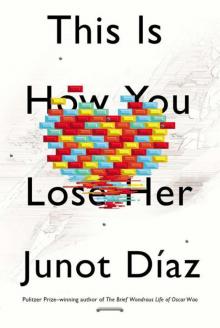 This Is How You Lose Her
This Is How You Lose Her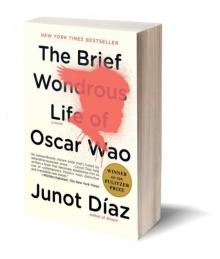 The Brief Wondrous Life of Oscar Wao
The Brief Wondrous Life of Oscar Wao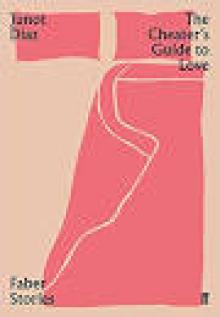 The Cheater's Guide to Love
The Cheater's Guide to Love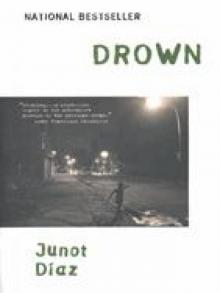 Drown
Drown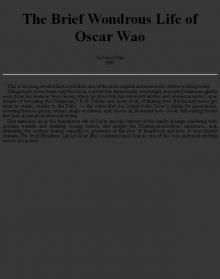 2007 - The Brief Wondrous Life of Oscar Wao
2007 - The Brief Wondrous Life of Oscar Wao The Best American Short Stories 2016
The Best American Short Stories 2016